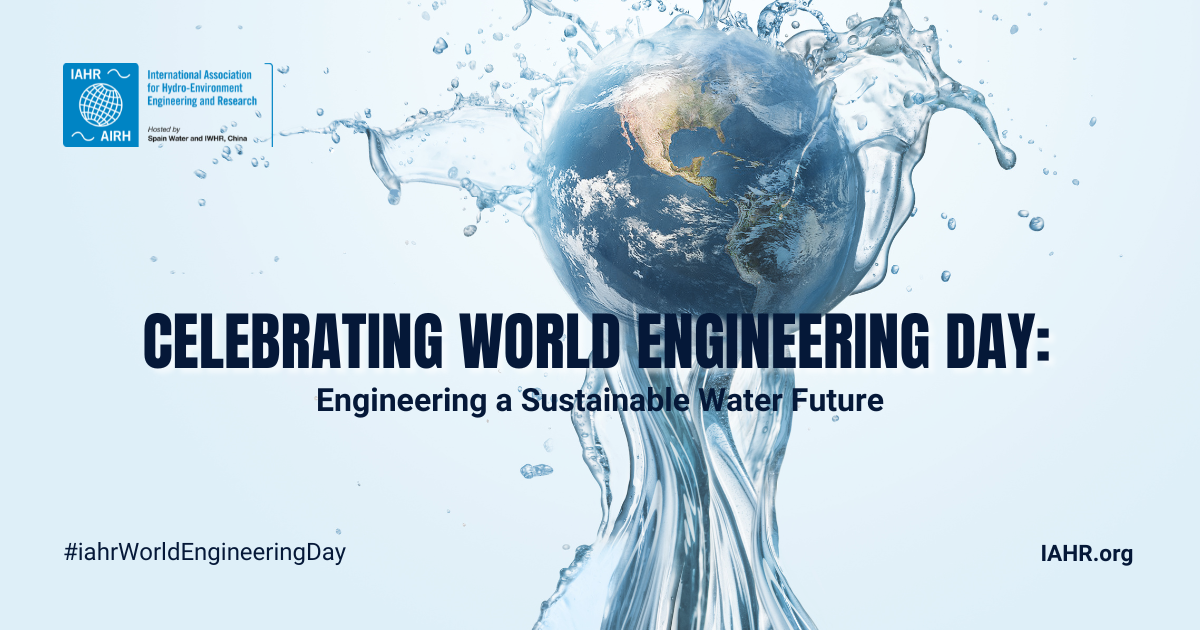Celebrating World Engineering Day: Engineering a Sustainable Water Future
IAHR has been at the forefront of addressing some of the world’s most pressing water challenges for nine decades. From flooding and water scarcity to climate change adaptation and resilience. The contributions of our community of engineers, researchers, and professionals continue to shape the field of hydro-environmental engineering, driving solutions that ensure water for all and protect vital environmental resources.
IAHR joins UNESCO in celebrating World Engineering Day for Sustainable Development 2025. This year, the vital role of engineers in achieving the United Nations' Sustainable Development Goals (SDGs) is highlighted, emphasizing the significance of engineering in developing solutions for sustainable development. This mission resonates deeply with IAHR’s work in the water sector. The SDGs have been a guiding framework for IAHR's Strategic Plan. This reinforces our mission and the importance of engineering in advancing solutions that foster both social and environmental sustainability.
Aligned with our mission, IAHR’s Strategic Plan focuses on four Thematic Priority Areas, essential to shaping a more sustainable future:
Climate Change Adaptation and Mitigation: IAHR is committed to developing engineering solutions that help communities and ecosystems adapt to the impacts of climate change, supporting SDG 13.
Water for the Energy Transition, Food Security, and Nature: IAHR focuses on ensuring that water resources are efficiently managed to support the transition to cleaner energy sources, enhance food security (SDG 2), and maintain ecological balance (SDG 6 and SDG 15).
Improving Resilience Against Water Hazards: IAHR addresses the growing risks of water-related hazards such as floods and droughts, advancing engineering techniques and strategies that mitigate these risks and protect vulnerable populations, which contribute to SDG 11 and SDG 13.
Digital Transformation: Harnessing the power of new technologies, IAHR is helping to drive digital transformation in the water sector, enabling more effective management, monitoring, and decision-making through the integration of data and innovative tools, contributing to SDG 9.
These four priorities form the foundation of IAHR's approach to sustainable water management, helping to address both current and future water challenges on a global scale.
Engineers are uniquely positioned to drive change and build a more sustainable and equitable future. The field of water engineering is founded and nurtured by collaboration among colleagues. The upcoming 41st IAHR World Congress will take place in Singapore from 22 to 27 June 202. The theme for this edition is “Innovative Water Engineering for Sustainable Development”, and it will serve as a platform for interdisciplinary dialogue, the exchange of cutting-edge knowledge, and the exploration of innovative solutions to the world’s most pressing water-related challenges.
We invite the community to join us in this unique event. Together, we can continue to advance the field of hydro-environmental engineering and create innovative solutions that address the global water challenges of today and tomorrow.
Background
In 2020, this global celebration was renamed World Engineering Day as a joint venture with UNESCO and WFEO to highlight engineers' achievements around the world and improve the public understanding of the importance of engineering and technology.
The World Engineering Day (WED) for Sustainable Development is celebrated for its fourth time on the 4th of March every year as a UNESCO international day promoting the profile of engineers and engineering.
Statement from the IAHR President
“On this World Engineering Day and with the special focus on the Sustainable Development Goals, we recognise the important contributions of engineers around the world, not only on a technical and scientific level, but also on a societal level. Our commitment to advancing hydro-environmental engineering and sustainable water solutions remains as strong as ever. Through collaboration, innovation and research, we continue to shape a future where water is accessible to all and the environment is protected for generations to come.”
— Philippe Gourbesville, President of IAHR.
